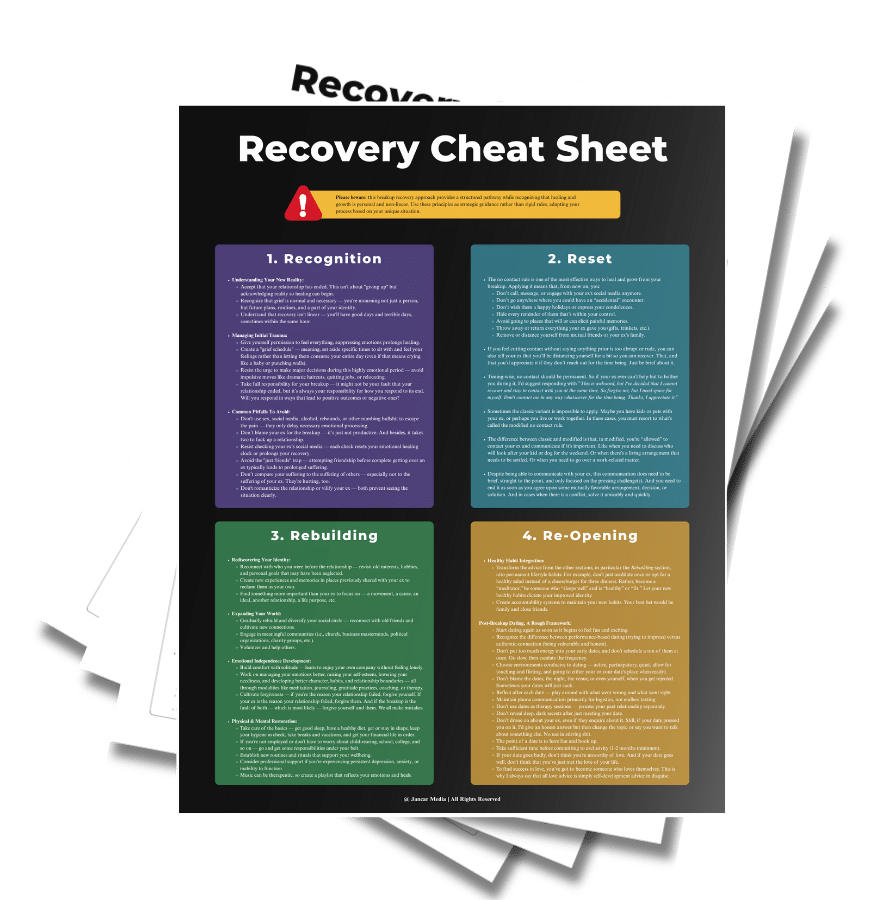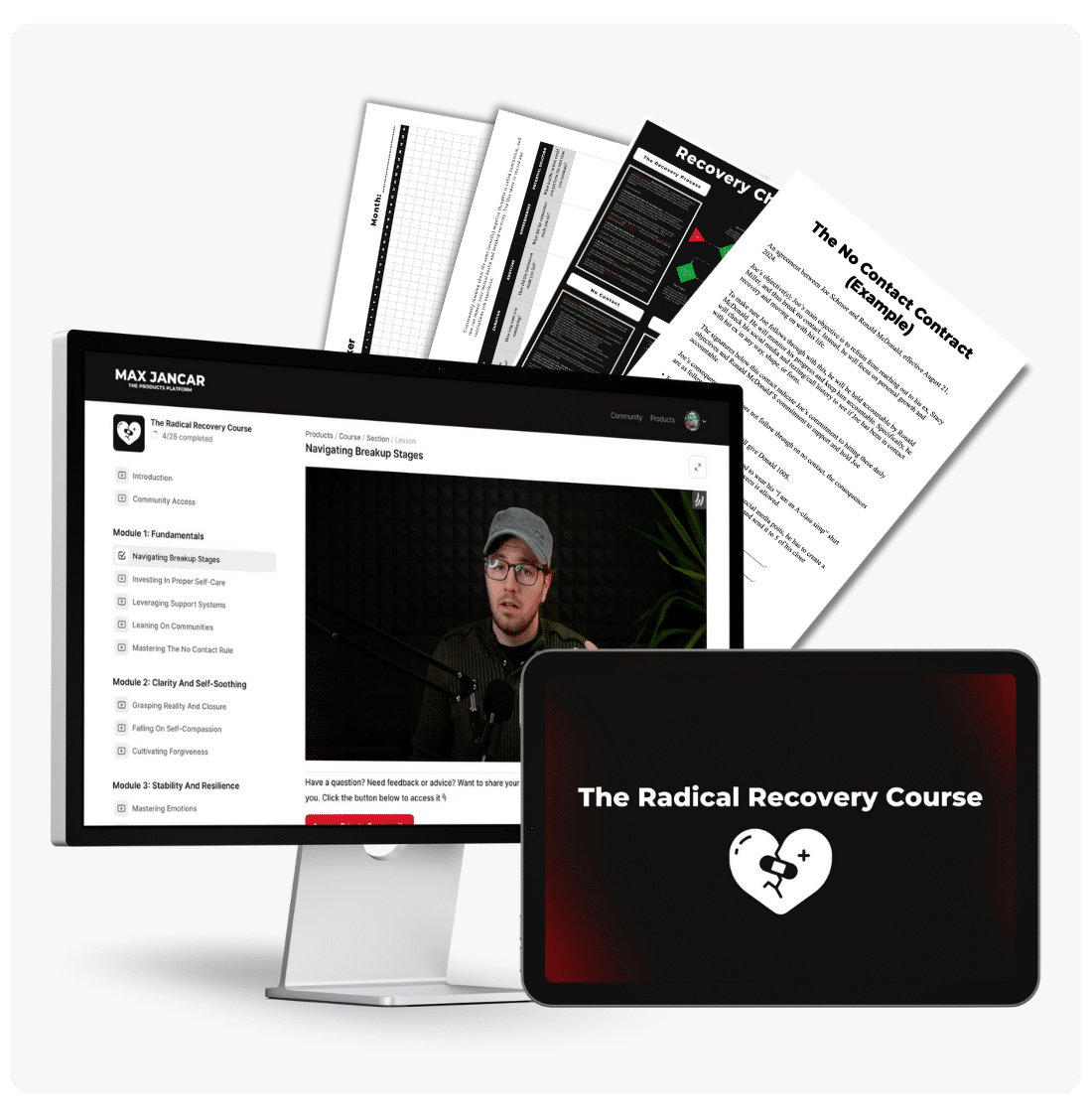Click play to listen to this article.
Whether you’re the dumpee or the dumper, there’s always a chance to feel guilt after a breakup. Maybe you feel guilty for leaving prematurely. Maybe you feel guilty for not putting enough effort into the relationship. Or perhaps you feel guilty for what you’ve done or said — or what you failed to do and say.
Regardless of why you feel guilt, the emotion can be overcome. This article will help you do so.
I’ll start by defining guilt and unpacking its inner workings, so we’re all on the same page about what we’re discussing. Then, I’ll list some reasons you might feel guilt after a breakup and address the many negative ways the emotion hinders us and some ways where it actually helps us. After setting a solid theoretical foundation, I’ll conclude by listing a couple of powerful solutions to overcoming guilt.
So buckle up — because shit’s about the get pretty psychological. In a simple-to-understand, pragmatic way, of course.
A guide to breakup recovery based on embracing discomfort, extracting wisdom from dark moments, and healing through evidence-based practices.
Order Your CopyGuilt After A Breakup: A Primer
Post-breakup guilt is a complex emotion, usually best described as a mixture of disappointment and regret. Typically, we feel it because we haven’t lived up to a set of self-selected expectations during the relationship, the breakup itself, or after the catastrophe.
To get the obvious out of the way: guilt is an innate part of the human experience. Like anger and sadness or happiness and lust, it’s a human universal. We all feel it and it’s completely normal to feel it.
That said, guilt can be both destructive and constructive. It can lead to negative changes in behavior and mindset as well as impaired relationships. Or it can lead to positive changes in behavior and mindset as well as improved relationships.
More on this later. For now, let’s discuss why you might feel guilt in the first place. Ideally, figuring out the “Why” will lead you to find a suitable “How,” as in, how to best resolve your particular flavor of guilt.
Why Guilt After A Breakup Occurs
Here are a few important reasons we feel guilt after a breakup, listed in no particular order. Some I already alluded to, most you’ve probably never encountered before.
1. Unexpected Relief
An often unexpected and thus guilt-inducing reaction to a breakup. You see, occasionally, we feel good after it. And I mean fucking fantastic. We can do whatever we wan’t, whenever we want, with whomever we want. It was a long time since we tasted such freedom.
Yet, sometimes, this relief cuts both ways. On the one hand, it’s novel and exciting. On the other, it can cause us to feel guilty about feeling so great despite going through something as terrible as a breakup.
2. Unmet Commitments
When we enter a relationship, we often make explicit or implicit commitments to our partner and vice versa. These range from plans for the future — like shared vacations, pets, kids, or marriage — to simple emotional support.
Falling short of these commitments, whether due to changing feelings, circumstances, or personal growth, is a major reason we feel guilt after a breakup. Simple as that.
3. Societal Norms
Society often harbors these erroneous, often dumb, norms about relationships. Like how a successful relationship lasts “forever” or how ending a relationship is a sign of personal failure.
While things are improving in this aspect, many people still hold certain dumb norms in high regard. And because they got into a breakup and, thus, haven’t adhered to them, they feel guilty about it.
4. Self-Blame
Self-blame is another common reason we feel guilt after a breakup. But there’s a catch.
For one, self-blame can lead to more thorough introspection about where you went wrong in your relationship and why it failed. And then that introspection can foster personal growth.
In contrast, self-blame, especially when intense and frequent, can lead to the development of a nasty inner critic, which magnifies guilt and damages self-esteem.
5. Mutual Friends and Family
Often relationships involve mutual friends, and the demise of one can strain those bonds, leading to — you’ve guessed it — guilt.
Likewise, if your family members were close to your ex, they might also have a problem with you breaking up. Perhaps they expected a different outcome and are now disappointed. And suddenly, you have another spiked dumbbell of guilt hurled at that dainty face of yours.
6. Missed Opportunities
Another cause of guilt is the “what ifs” and the “if onlys” an average person keeps ruminating about after their breakup.
If only I had been less complacent. What if I had dealt with my emotional issues promptly? If only my ex changed whatever bugged me about them.
It’s these thoughts that highlight the many missed opportunities for connection and intimacy, and with it, sometimes make us feel guilty.
7. Premature Dumping
Arguably the rarest reason we feel guilt after a breakup, but still worth pointing out. Sometimes we simply break up with our ex before it was actually necessary.
Either because our emotions got the best of us, or because we riled up our ex on purpose so they would initiate the dumping. Either way, we feel guilty — perhaps even yearn for another chance — and it sucks.
An online interactive video course that teaches you how to get past a breakup so you can create a new possibility for love (with your ex or someone new).
Get Instant AccessHow Guilt After A Breakup Affects Us
Emotions cut both ways, and guilt is no exception. As suggested earlier, it can be either destructive or constructive. It can lead to negative consequences but, interestingly, also to positive ones. Let me explain.
The Negatives Of Feeling Guilt After A Breakup
The most dangerous part about guilt is leaving it unattended and letting it transpire into shame. Because, unlike guilt, shame doesn’t go away as smoothly. It usually becomes a part of our identity and most people need years of therapy to resolve it.
On top of this, shame leads to damaged self-worth and esteem. Then, that damaged self-worth and esteem prompts excessive rumination and self-blame. And the rumination and self-blame drive us toward depression. Suddenly, everything turns to shit.
You become a withdrawn, whiny downer (see: playing the perpetual victim) and eventually annoy your friends to the point where they begin to avoid you. Next, you start to believe that you won’t amount to anything and turn into a freeloader, a nihilist (the bad kind), or both. And then you start making dumb decisions like doing coke in some dingy gas station’s toilet instead of coming to your daughter’s birthday.
As time goes by, due to your guilt-ridden shame and the problems it brings, you begin to think that you’re somehow special and unique. You start to buy into the idea that you’re burdened in a way nobody else is and that you deserve special treatment.
Congratulations — this is when guilt transpires into narcissism. Which is, apart from joining a multilevel marketing scheme, one of the best ways to lose everyone who gives a shit about you and end up miserable.
The Positives Of Feeling Guilt After A Breakup
Lots of people preach that guilt is a useless emotion devoid of any redeeming qualities. Some even insist on clearing guilt out of one’s system completely. Honestly? I never bought into this line of thinking.
You don’t need to eliminate guilt. Sure, managing it better and resolving the tightest and most giant of knots is great — probably even fundamental to leading a happy and fulfiling life.
However, you don’t need to, nor can you realistically, completely dislodge the emotion from your system. I’d even argue that harboring some guilt after a breakup is actually a net positive. And here’s why.
First, guilt catalyzes self-reflection. It encourages us to look back at our dead relationship more objectively, understand our mistakes, and learn from them, leading to improvements in future relationships, not to mention closure and healing.
Second, sometimes we should feel guilt. Like if you rampantly cheated on your ex and that’s why they dumped you. You see, that guilt then deters you from cheating again in your next relationship, and that’s wonderful for everyone involved.
Last, guilt causes us to develop better empathy, allowing us to understand the pain we’ve perhaps caused our ex, which can lead to more vulnerable and compassionate behaviors in the future, further leading to healthier relationships.
How To Overcome Guilt After A Breakup
We’ll go from the most basic, easy-to-follow solutions to the more psychologically dense and brain-intensive one’s, each piggybacking on the former.
1. Take Care Of The Fundamentals
Dealing with guilt gets much easier if you have your shit together. So stick to the following.
- Exercise regularly, get quality sleep, eat a healthy, balanced diet, and maintain good hygiene. More information: A No Bullshit Guide To Self-Care After A Breakup.
- Try meditation, journaling, and therapy. And stick with the activities for at least a few weeks before quitting if any of them don’t resonate. More information: The Holy Trinity Of Breakup Recovery.
- Surround yourself with friends, peers, and family members you trust and who are able and willing to support you emotionally. More information: Never Suffer Alone.
- Share your guilt with the people you trust, especially if it’s uncomfortable or embarrassing. Because that’s a massive sign you need an outlet for it ASAP!
2. Don’t Identify With Your Actions
We all make mistakes, we all fail sometimes. It’s part of the human condition. Our lives are dispersed with lapses of judgment and actions we wish we could take back. None of this means you’re inherently messed up. It means you’re human.
And since you’re human, perhaps all too human, it means you possess this really nifty ability to — drum roll… — learn from your mistakes and failures. To use them as motivation to be better in future relationships. To even save others from making similar fuckups.
These are the things you should focus on. Not how your mistakes and failures define you or whatever other stank of the same bullshit you’ve cobbled together in your mind.
Think “I made mistakes; I caused failures,” not “I am my mistakes; I am a failure.”
3. Empathize With The Real Motivation Behind Your Actions
After recognizing you’re not your guilt-inducing mistakes and failures, dive into why you’ve made them in the first place.
Maybe you became withdrawn and cold, not because there’s something wrong with you, but simply due to unmet needs and unresolved issues your ex wasn’t willing to resolve.
Maybe you became codependent, not because you were trying to push your now-ex away or make them feel like shit, but because you spent your entire childhood with parents who made you feel like you didn’t matter and love was always something you needed to fight for, and you just didn’t fucking know any better.
Perhaps your relationship didn’t end because you’re a terrible, evil human. Perhaps it ended because you felt underappreciated and unloved and just had to get your appreciation and love from that smoking-hot neighbor who kept eyeing you for the last six months.
Whatever the case, coming to terms with the why of your mistakes and failures allows you to learn necessary lessons from the fuckups to improve yourself. And once you’ve improved yourself, it’s almost impossible to feel guilty over whatever led to it.
4. Show Yourself Some Kindness
This doesn’t mean you must condone or dismiss your past actions. It simply means you recognize your humanity — your capacity for error — and explain as well as convince yourself that it’s okay. That it’s fine.
If you’re having trouble showing yourself kindness, try to ask yourself what a kind and compassionate friend would tell you in your situation. It probably isn’t nearly as harsh as what you’re telling yourself now. Then try to talk to yourself in a way that friend would.
As cringey as it sounds, this stuff works. And more people should do it. Instead of opting for the vanilla: crawling under their bedsheet and crying, sulking, and stressing the fuck out the whole time.
5. Do Better In Your Next Relationship
Be it with your ex or someone else, don’t repeat your mistakes and failures. This is the final way to resolve guilt — and to avoid further guilt.
Use your fuckups to be better. Turn them into fuel for self-improvement. It’s that simple.
Good luck.
(Optional) Top Questions About Guilt After A Breakup
Is It Normal To Feel Guilt After A Breakup?
Yes, feeling guilty after a breakup is entirely normal and a typical response for many people. We all feel guilty occasionally, be that for whatever we’ve said or didn’t say or whatever we’ve done or didn’t do. However you look at it, it’s a universal human experience.
Is It Normal To Feel Guilty, Even If The Breakup Was For The Best?
Yes, feeling guilt after a breakup, even in such situations is completely normal. I’d argue even common! That’s because even when a breakup is the healthiest decision for both parties, it still usually stings like a motherfucker.
Why Do I Feel Guilty For Moving On From My Ex?
Feeling guilty for moving on from your ex is often a reflection of lingering emotional attachments or the internalized belief that finding happiness post-breakup somehow diminishes the significance of the past relationship. This is all bullshit, of course. It usually feels true, but when you peel back the layers, you realize the entire idea is set on a non-existent intellectual foundation, making it practically moot.
How Long Does Guilt After A Breakup Last?
The duration of guilt after a breakup varies significantly. Some people have to deal with it only a few weeks after their breakup. Other people deal with it for years. It really depends on the mistakes you’ve made or the failures you experienced. The more serious they are, the longer you’ll probably feel guilty.
Does Post-Breakup Guilt Ever Go Away?
Of course, guilt can and does usually go away, especially with intentional emotional work and self-compassion. That said, sometimes the emotion can be so severe you need professional help to overcome it. But even then, it can be beaten.
Should I Talk To Someone About My Guilt?
Absolutely. Talking to someone about your guilt, whether a trusted friend, family member, or a mental health professional, can be incredibly therapeutic. Even if you, in the end, get no practical solutions, the fact that you’ve vocalized and expressed your guilt should alleviate it, at least a bit.
Should I Apologize To My Ex If I Feel Guilty?
An apology can be meaningful if it’s sincere and brief, you have a good reason for it, and if you believe it will help both parties find closure. However, for the most part, it only makes things worse, especially if you want to get back with your ex. So really consider the timing and the current state of your relationship with your ex before expressing it.
Can Guilt After A Breakup Affect My Next Relationship?
Yes, unresolved post-breakup guilt can affect future relationships by adversely influencing your emotional availability and your capacity for trusting other people. And if that guilt ever turns into shame or even narcissism — then that definitely affects your relationships for the worse. So please, do something about your guilt.
What If I Feel Guilty Because I Don’t Feel Guilty?
While a bit more emotionally complex, this is still a better problem to have that to feel guilty for some other, more typical reason. Regardless, the solutions to resolving your guilt are the same as if you felt guilty about something else.
This cheat sheet lays out 40+ solutions to overcoming a breakup so you can create a new opportunity for love — be that with your ex or someone completely different.
Get The Free Cheat Sheet


